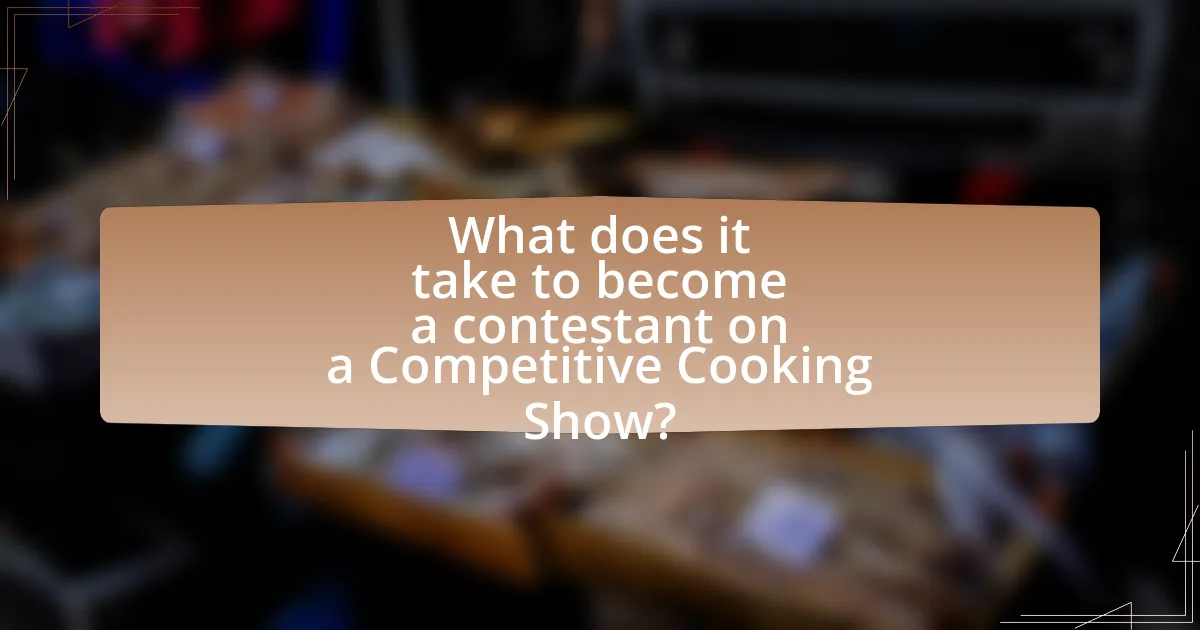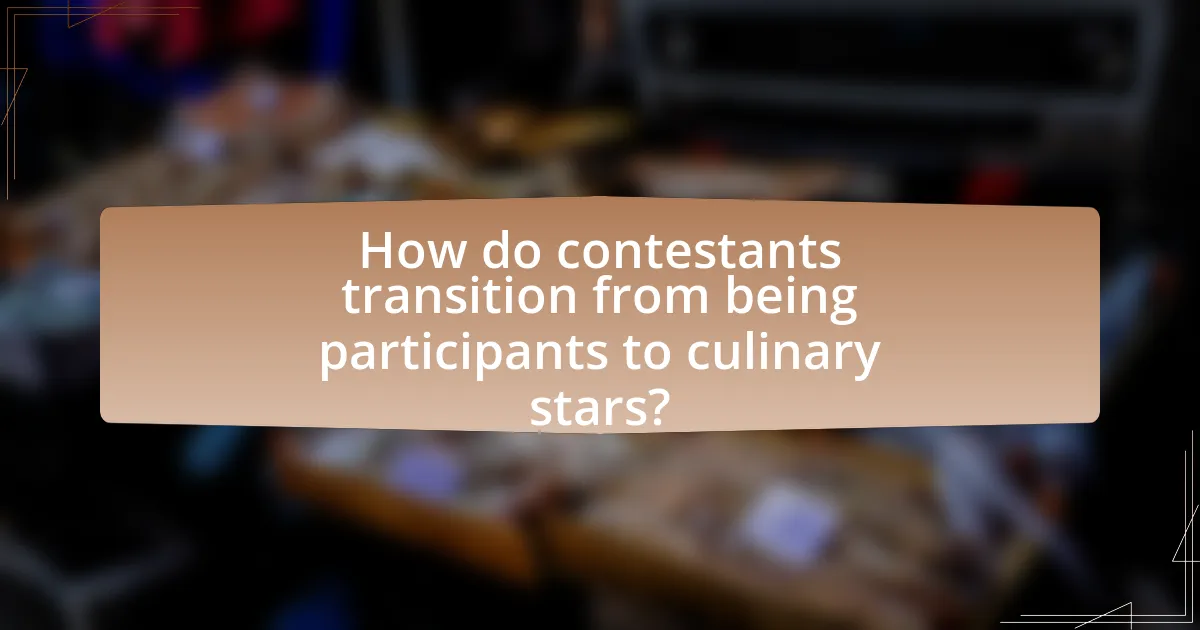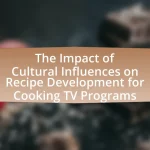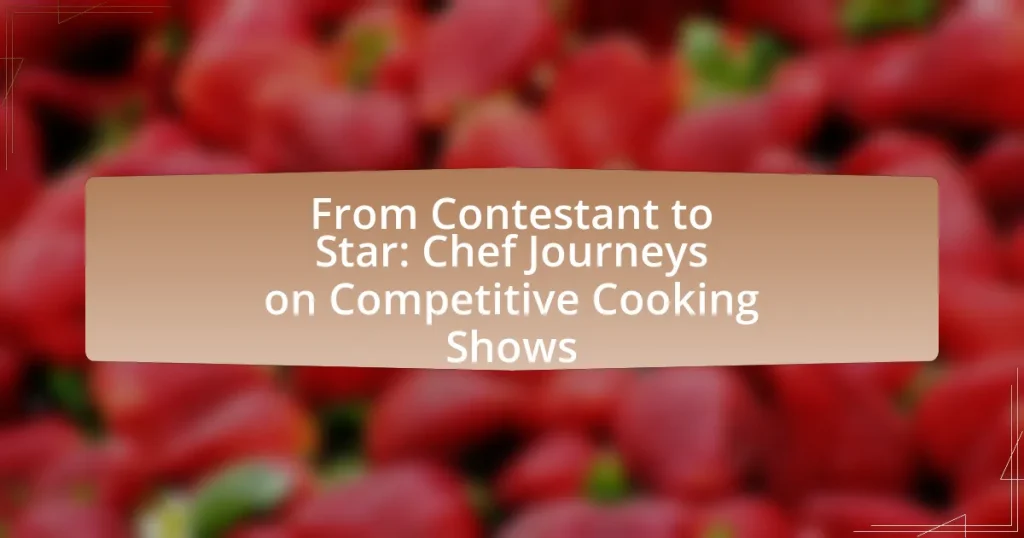Competitive cooking shows are television programs where chefs or home cooks compete in culinary challenges, showcasing their skills under pressure. The article explores the operational formats of these shows, including elimination competitions and timed challenges, and examines how judges evaluate contestants based on dish quality and creativity. It highlights the popularity of these shows, driven by entertainment value and viewer demographics, and discusses the application process for contestants, the challenges they face, and the skills they develop. Additionally, the article outlines how contestants can transition to culinary stardom post-competition, leveraging their exposure and opportunities in the industry.

What are Competitive Cooking Shows?
Competitive cooking shows are television programs where chefs or home cooks compete against each other in culinary challenges to showcase their cooking skills. These shows often feature timed cooking tasks, specific themes, or mystery ingredients, and are judged by culinary experts or celebrity chefs. The format has gained popularity since the early 2000s, with notable examples including “Top Chef” and “MasterChef,” which have contributed to the rise of cooking as a competitive sport and have launched the careers of many contestants into stardom in the culinary world.
How do Competitive Cooking Shows operate?
Competitive cooking shows operate by bringing together chefs who compete against each other in timed cooking challenges, judged by a panel of experts. Each episode typically features a specific theme or set of ingredients that contestants must incorporate into their dishes. Contestants are eliminated based on their performance, with the final winner often receiving a prize, such as a cash award or a culinary opportunity. The format of these shows often includes various rounds, such as preliminary heats leading to a finale, and they may involve audience participation or viewer voting. The success of these shows is evidenced by their popularity and the significant viewership they attract, with some programs like “MasterChef” and “Top Chef” becoming cultural phenomena.
What are the different formats of Competitive Cooking Shows?
Competitive cooking shows feature various formats, including elimination competitions, timed challenges, team-based contests, and themed cook-offs. Elimination competitions, such as “MasterChef,” involve contestants facing off in rounds where the weakest participant is eliminated until a winner is determined. Timed challenges, like those in “Chopped,” require chefs to prepare dishes within strict time limits using specific ingredients. Team-based contests, exemplified by “The Great British Bake Off,” involve contestants working in pairs or groups to complete tasks. Themed cook-offs, such as “Iron Chef,” focus on specific culinary themes or secret ingredients that contestants must incorporate into their dishes. Each format engages viewers by showcasing culinary skills and creativity under pressure.
How do judges evaluate contestants in these shows?
Judges evaluate contestants in competitive cooking shows primarily based on the quality of their dishes, presentation, creativity, and adherence to the challenge requirements. Each dish is assessed for taste, texture, and overall execution, with judges often providing specific feedback on these elements. For instance, in shows like “MasterChef,” judges utilize a scoring system that quantifies these aspects, allowing for a structured comparison among contestants. This method ensures that evaluations are consistent and based on established culinary standards, which enhances the fairness and transparency of the judging process.
Why are Competitive Cooking Shows popular?
Competitive cooking shows are popular due to their engaging format that combines entertainment, culinary skill, and viewer participation. These shows attract audiences by showcasing intense competition among chefs, which creates suspense and excitement. According to a Nielsen report, cooking shows have seen a significant rise in viewership, particularly during the pandemic, as people sought new forms of entertainment and inspiration for home cooking. The blend of drama, creativity, and the potential for contestants to achieve fame and success resonates with viewers, making these shows a staple in modern television.
What role does entertainment play in the success of these shows?
Entertainment is crucial to the success of competitive cooking shows as it engages viewers and enhances their overall experience. The combination of drama, personality, and culinary challenges captivates audiences, leading to higher ratings and increased viewer loyalty. For instance, shows like “MasterChef” and “Top Chef” incorporate storytelling elements and emotional arcs that resonate with viewers, making them more invested in the contestants’ journeys. According to a Nielsen report, engaging content can boost viewer retention by up to 30%, demonstrating that entertainment value directly correlates with a show’s popularity and success.
How do viewer demographics influence show formats?
Viewer demographics significantly influence show formats by determining content themes, presentation styles, and engagement strategies. For instance, younger audiences tend to prefer fast-paced, visually engaging formats with interactive elements, while older demographics may favor traditional storytelling and slower pacing. Research indicates that shows targeting millennials often incorporate social media integration and diverse representation, reflecting their values and preferences. Conversely, programs aimed at older viewers might emphasize nostalgia and familiar culinary techniques, aligning with their experiences and interests. This alignment with demographic preferences ensures higher viewer retention and satisfaction, ultimately impacting the show’s success in the competitive landscape of television programming.

What does it take to become a contestant on a Competitive Cooking Show?
To become a contestant on a competitive cooking show, individuals typically need to apply through an official casting process that includes submitting an application, providing a cooking resume, and often participating in auditions. Many shows require contestants to demonstrate culinary skills, creativity, and a unique cooking style during these auditions. For example, shows like “MasterChef” and “Top Chef” have specific criteria that include age restrictions, residency requirements, and sometimes professional cooking experience. Additionally, contestants may need to showcase their personality and ability to work under pressure, as these traits are crucial for engaging television.
What are the application processes for these shows?
The application processes for competitive cooking shows typically involve several key steps. First, interested contestants must complete an online application form, which often requires personal information, cooking experience, and a brief video showcasing their culinary skills. Following the submission, selected applicants may be invited to participate in auditions, where they demonstrate their cooking abilities in person. Finally, producers review the auditions and select contestants based on their talent, personality, and fit for the show. This structured process ensures that only the most qualified chefs advance to compete on the show.
What qualifications do aspiring contestants need?
Aspiring contestants need culinary skills, creativity, and experience in the kitchen. These qualifications are essential as they enable contestants to prepare diverse dishes under pressure, which is a common requirement in competitive cooking shows. Additionally, many shows may require contestants to have formal culinary training or relevant work experience in the food industry, such as working in restaurants or catering. This experience provides practical knowledge and techniques that are crucial for success in high-stakes cooking environments.
How do contestants prepare for auditions?
Contestants prepare for auditions by honing their culinary skills, developing unique recipes, and practicing their presentation techniques. They often engage in extensive cooking practice to refine their techniques and ensure they can execute dishes flawlessly under pressure. Additionally, contestants may research the show’s format and requirements, tailoring their audition dishes to align with the judges’ preferences and the competition’s theme. This preparation is crucial, as successful contestants often demonstrate creativity, technical proficiency, and a strong personal story that resonates with the audience and judges.
What challenges do contestants face during the competition?
Contestants face numerous challenges during competitive cooking shows, including time constraints, high-pressure environments, and the need for creativity under stress. Time constraints often require contestants to prepare complex dishes within limited periods, which can lead to mistakes and subpar results. The high-pressure environment, amplified by the presence of judges and cameras, can affect contestants’ performance and decision-making abilities. Additionally, contestants must consistently demonstrate creativity and innovation, as they are often tasked with creating unique dishes from unfamiliar ingredients or themes, which can be daunting and lead to anxiety. These challenges are critical in determining their success in the competition.
How do time constraints affect cooking performance?
Time constraints significantly impair cooking performance by increasing stress levels and reducing the quality of food preparation. When chefs face limited time, they often rush through tasks, leading to mistakes such as improper ingredient measurements or inadequate cooking times. Research indicates that high-pressure environments can lead to decreased cognitive function, which negatively impacts decision-making and creativity in cooking. For instance, a study published in the Journal of Culinary Science & Technology found that chefs under time pressure were more likely to produce dishes with lower flavor profiles and presentation quality compared to those with ample time. This demonstrates that time constraints can hinder not only the technical execution of cooking but also the overall culinary experience.
What psychological pressures do contestants experience?
Contestants on competitive cooking shows experience significant psychological pressures, including stress from high-stakes competition, fear of failure, and the impact of public scrutiny. The intense environment often leads to anxiety, as contestants must perform under tight time constraints and face the judgment of judges and viewers. Research indicates that such pressures can result in mental health challenges, with studies showing that reality TV participants report higher levels of stress and anxiety compared to the general population. For instance, a study published in the Journal of Broadcasting & Electronic Media found that reality show contestants often experience emotional distress due to the competitive nature and the pressure to succeed, highlighting the psychological toll of the experience.

How do contestants transition from being participants to culinary stars?
Contestants transition from being participants to culinary stars by leveraging their exposure on competitive cooking shows to build personal brands and gain industry recognition. This transition often involves securing opportunities such as restaurant openings, cookbook deals, and television appearances, which are facilitated by the visibility and credibility gained during the competition. For instance, many successful chefs, like Melissa d’Arabian from “The Next Food Network Star,” have utilized their platform to launch successful careers, evidenced by her bestselling cookbooks and cooking shows. This pattern demonstrates that the combination of talent showcased during the competition and strategic post-show marketing can effectively elevate contestants to culinary stardom.
What opportunities arise for contestants after the show?
Contestants on competitive cooking shows often gain significant opportunities after the show, including career advancements, increased visibility, and networking prospects. Many contestants leverage their television exposure to secure job offers in prestigious restaurants, launch their own culinary ventures, or become food influencers. For instance, a study by the Culinary Institute of America found that 70% of participants in competitive cooking shows reported enhanced career opportunities post-show. Additionally, contestants frequently receive invitations to participate in food festivals, cooking demonstrations, and media appearances, further solidifying their presence in the culinary industry.
How do contestants leverage their television exposure?
Contestants leverage their television exposure by building personal brands and expanding their professional networks. This visibility allows them to attract new opportunities, such as restaurant partnerships, cookbook deals, and sponsorships. For instance, many contestants gain significant social media followings, which can lead to monetization through endorsements and collaborations with food-related brands. Additionally, successful contestants often participate in public speaking engagements and culinary events, further enhancing their reputation and marketability in the culinary industry.
What role does social media play in building a chef’s brand?
Social media is crucial in building a chef’s brand by providing a platform for visibility, engagement, and audience connection. Chefs can showcase their culinary skills, share recipes, and interact with followers, which enhances their personal brand and fosters a loyal community. For instance, a study by the Pew Research Center indicates that 69% of adults in the U.S. use social media, making it an effective tool for chefs to reach a broad audience. Additionally, chefs who actively engage on platforms like Instagram and TikTok can leverage visual content to attract attention, as these platforms prioritize visually appealing posts, which is essential in the food industry. This engagement not only increases their follower count but also opens opportunities for collaborations, sponsorships, and increased visibility in competitive cooking shows.
What skills do successful contestants develop during their journey?
Successful contestants on competitive cooking shows develop a range of essential skills, including culinary techniques, time management, creativity, and adaptability. Culinary techniques encompass knife skills, cooking methods, and flavor pairing, which are critical for executing dishes under pressure. Time management is vital as contestants must prepare meals within strict time limits, enhancing their ability to prioritize tasks efficiently. Creativity is fostered through the need to innovate and present unique dishes that stand out to judges. Adaptability is also crucial, as contestants often face unexpected challenges, requiring them to think on their feet and adjust their strategies quickly. These skills collectively contribute to their growth and success in the competitive cooking environment.
How do cooking techniques evolve through competition experience?
Cooking techniques evolve through competition experience by exposing chefs to diverse culinary challenges and innovative methods. In competitive cooking environments, chefs must adapt quickly, often learning new techniques under pressure, which enhances their skill set. For instance, competitions frequently introduce unfamiliar ingredients or cooking styles, prompting chefs to experiment and refine their techniques. Research indicates that high-stakes environments foster creativity and adaptability, leading to significant improvements in culinary skills. A study published in the Journal of Culinary Science & Technology highlights that chefs who participate in competitions report increased confidence and proficiency in various cooking methods, demonstrating the transformative impact of competitive experiences on their culinary techniques.
What soft skills are enhanced through participation in these shows?
Participation in competitive cooking shows enhances several soft skills, including teamwork, communication, adaptability, and time management. Contestants must collaborate effectively with others, which fosters teamwork and improves interpersonal communication skills. The fast-paced environment of these shows requires participants to adapt quickly to changing circumstances and unexpected challenges, thereby enhancing their adaptability. Additionally, managing tight deadlines and multitasking during cooking challenges sharpens their time management abilities. These skills are critical in both culinary careers and broader professional contexts, as evidenced by the high-pressure nature of the culinary industry where teamwork and effective communication are essential for success.
What are the best practices for aspiring chefs on Competitive Cooking Shows?
Aspiring chefs on competitive cooking shows should focus on mastering their culinary skills, understanding the competition format, and effectively managing time. Mastering culinary skills involves practicing various cooking techniques and flavor profiles to ensure versatility and creativity in dishes. Understanding the competition format is crucial, as it allows chefs to strategize their approach, whether it involves timed challenges or specific themes. Effective time management is essential, as many competitions have strict time limits; chefs must plan their cooking process to ensure all components of their dish are completed within the allotted time. These practices are supported by the experiences of successful contestants who emphasize preparation, adaptability, and composure under pressure as key factors in their success.
How can contestants effectively manage stress during competitions?
Contestants can effectively manage stress during competitions by employing techniques such as deep breathing, visualization, and time management. Deep breathing exercises help lower anxiety levels by promoting relaxation and focus, which is crucial in high-pressure environments like cooking competitions. Visualization techniques allow contestants to mentally rehearse their performance, enhancing confidence and reducing uncertainty. Additionally, effective time management enables contestants to allocate their time wisely, minimizing the feeling of being rushed and overwhelmed. Research indicates that these strategies can significantly improve performance under stress, as evidenced by studies showing that athletes who practice mental skills report lower stress levels and better outcomes in competitive settings.
What strategies can help contestants stand out to judges?
Contestants can stand out to judges by showcasing unique culinary skills and creativity in their dishes. Demonstrating a signature style or innovative techniques can capture judges’ attention, as evidenced by successful contestants who often incorporate personal stories or cultural influences into their cooking. For instance, contestants who present dishes that reflect their heritage or personal experiences tend to create a memorable impression, as seen in various competitive cooking shows where storytelling enhances the overall presentation. Additionally, maintaining a strong stage presence and effective communication with judges can further elevate a contestant’s visibility, as judges often appreciate confidence and clarity in expressing culinary concepts.










